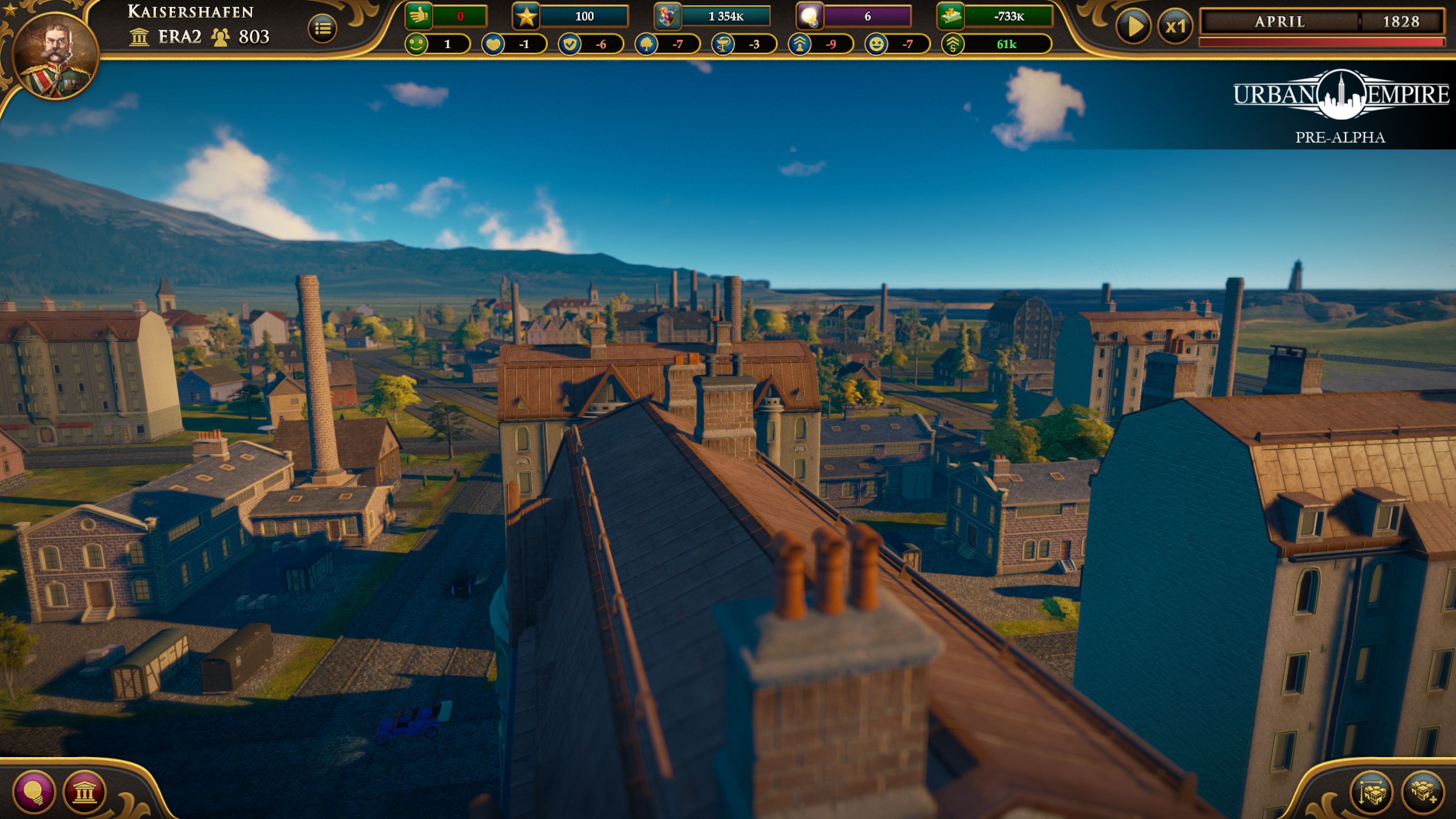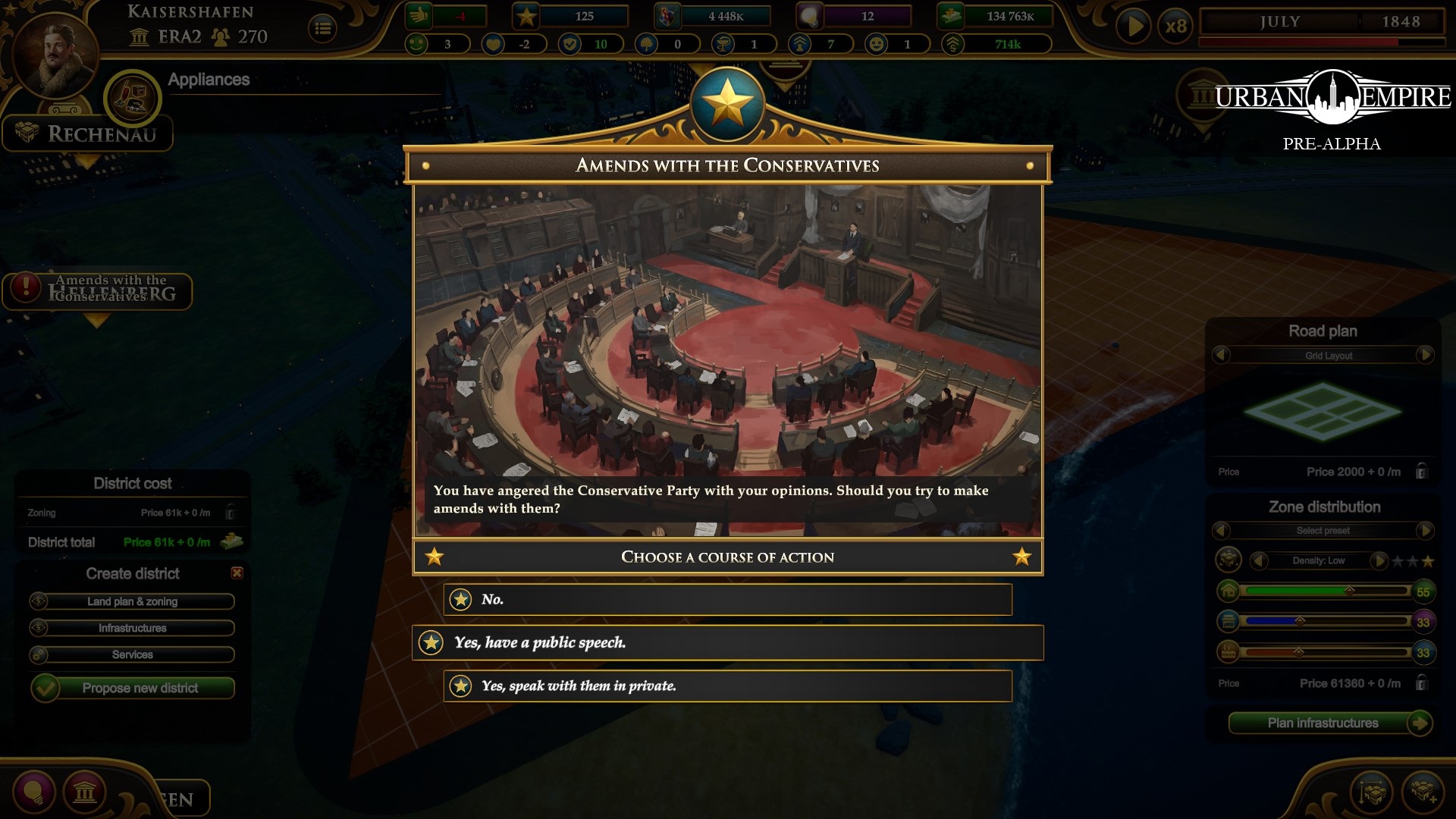Urban Empire heats up city building with political infighting

I've never been a fan of the way many city builders ignore the exhaustive political process governing the construction of real cities. It's easy to feel like a skyscraper-erecting god, and that can be fun, but I'd also like to see what it's like as a cog in a dynamic political machine. That's where Urban Empire, which is launching this fall, seeks to differ from the bunch: You're not an authoritarian force like in Cities: Skylines and SimCity, but a mayor who must balance the needs of his people and rival parties with every block you build—lest they vote you out of power and your legacy crumbles.
Where much of Urban Empire can feel familiar to people who play city builders, perhaps a little too familiar, that single twist also has some reaching implications. During GDC, I got the chance to sit down with Helge Peglow, one of the producers from Kalypso, and watch as he walked me through a pre-alpha build. In our short time together we built several city districts, passed laws through a democratic vote, and gathered dirt on a rival political party we could later use as leverage against them.
To stay in power, you might have to go against your ethics.
We started out on a spacious map, where Peglow plotted out our city's first district. Unlike Tropico, Urban Empire is straight-faced, and its treatment of history is much more realistic. The city building itself is the most familiar aspect: you'll chart out districts, balance the density of certain types of buildings, and tackle infrastructure problems while working towards new upgrades.
The foundation is quite lightweight, as planning new districts will automatically draw out the roads and city blocks for you instead of having to plot that yourself. There's still a handful of special buildings that you can place, like libraries or a city hall, but the city building doesn't seem to require the rigorous iteration that constructing a metropolis in Cities: Skylines takes. And even being in pre-alpha, the user interface looked easy to work with and intuitive.

Red tape
That derivative core is the base on which Urban Empire builds some really interesting ideas with its politics. There's very little you can do independently, as just about any decision that could cost money needs to first be passed through a vote on the city council. To succeed, you'll constantly be trading favors and balancing the needs of the various political parties in your government.
"To stay in power, you might have to go against your ethics," Peglow explains. Like Tropico 5, your city starts in one era and moves forward with time, evolving with advancements in technology and culture. Because of this, I can already see how Urban Empire might make for some challenging moral quandaries, as things that we may take for granted today, like women having the right to vote, are treated as an upgrade that you'll need to pay a cost to unlock. (It occurs to me that reducing civil rights movements to simple unlocks might undercut their significance, but we'll hold judgment on the system until we've played it.)
That cost extends beyond money or research points, also trading on the opinions of your citizens and political peers. Peglow explains that, because we're currently playing in the 1820s, pushing progressivist ideas as hard as you can wouldn't be as politically wise as picking and choosing battles that cleverly steer your city towards your political leanings.
Keep up to date with the most important stories and the best deals, as picked by the PC Gamer team.

Starting out, my mayor didn't really have anything too radical on his agenda, so it was hard to get a grasp of what a divisive vote would look like. When we proposed installing gas lamps for the city, thus increasing our security rating, one party was a stick in the mud and threatened to vote "nay." Though we still had more than the majority on our side, Peglow used a diplomacy-like window to threaten the rogue party to fall in line. That party's symbol on the for or against spectrum quickly swapped sides, but threatening is a short term solution with long term consequences.
With several parties in your government, each with their own agendas, keeping them all happy is going to be a tense balancing act. Favors for one party might upset another, and, no surprise, the parties are far less concerned about the good of the people in general than the good of their own. I really like the idea of playing a game where the tension comes internally, rather than from external threats like hostile nations.
The idea of a city builder that doesn't ignore that cities are diverse communities of people is really intriguing. And though I was only able to see a brief glimpse of the tension that can arise when those people don't get along, I think there's loads of potential for Urban Empire to feel familiar to city building fans while exploring more ethically-charged strategy.
With over 7 years of experience with in-depth feature reporting, Steven's mission is to chronicle the fascinating ways that games intersect our lives. Whether it's colossal in-game wars in an MMO, or long-haul truckers who turn to games to protect them from the loneliness of the open road, Steven tries to unearth PC gaming's greatest untold stories. His love of PC gaming started extremely early. Without money to spend, he spent an entire day watching the progress bar on a 25mb download of the Heroes of Might and Magic 2 demo that he then played for at least a hundred hours. It was a good demo.


